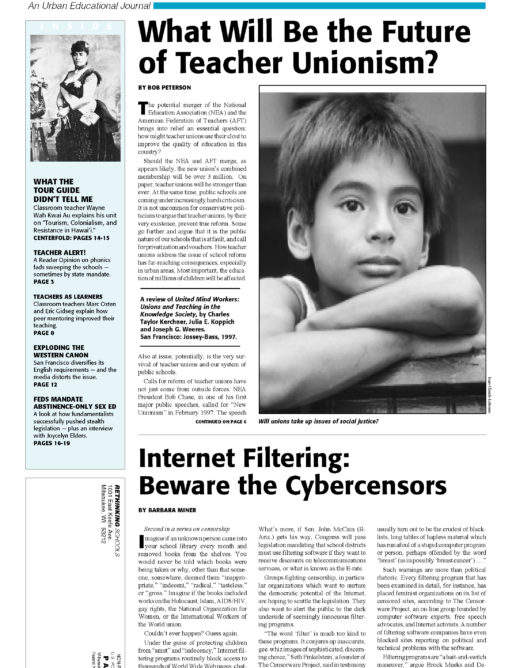Preview of Article:
Internet Filtering
Protecting children from pornography on the Internet is clearly an important issue. The discussion, however, has been dominated by fear, scare stories, and political posturing. Opponents of censorship are especially worried that some groups, especially politicians and organizations affiliated with the religious right, are using legitimate concerns about protecting children to push through a broader agenda of “cleaning up” the free-wheeling world of the Internet and imposing a moralistically and politically narrow view of the world.
One of the most important Internet censorship battles involved the Comunications Decency Act (CDA). Passed by Congress in the fall of 1996, the bill would, in practice, have banned “indecency” from the Internet as a way of protecting children from “patently offensive” material. Those sections of the law involving the Internet were found unconstitutional by the U.S. Supreme Court in June of 1997. The CDA was “a creature of the religious right, which had a significant hand in sculpting it, lining up politicians to support it, and then supplying them with the ammunition they needed to get it passed,” according to Jonathan Wallace, author of the book Sex, Laws, and Cyberspace and a founder of the Internet magazine The Ethical Spectacle.
The U.S. Supreme Court’s decision on the CDA has been called “the first free speech ruling of the 21st Century.” In it, the court argues that the Internet is akin to printed material, not to radio or television, and deserves the highest free speech protections. It reiterates that the Internet “is a unique and wholly new medium of worldwide human communication,” and that it is “no exaggeration to conclude that the content on the Internet is as diverse as human thought.” (The beginning pages of the majority decision are a wonderful summary of the Internet’s origins, scope and potential. Download the ruling.)
Both sides in the CDA suit stipulated as fact that, while pornography is available on the web, almost all sexually explicit images are preceded by warnings. The “odds are slim” that users would encounter such material accidentally, according to the court.
Having been set back in the courts, religious right groups and their allies turned toward imposing filtering software in public libraries and schools. In a typical story, the conservative Washington Times wrote a story in October 1997 with the headline: “Cyberporn at libraries has smut foes furious: We need to keep pornography out of taxpayer facilities.” A story that December in the Weekly Standard was titled: “Quiet in the Library! Children Viewing Porn.” The magazine, generally considered the leading conservative newsweekly, criticized the American Library Association for its concern with censorship and the use of filtering software in public libraries. It then asked:</p

